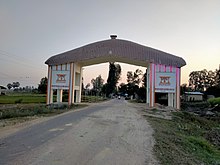Matihani, Mahottari
Matihani | |
|---|---|
 The view of the Laxmi Narayan Temple from the eastern side | |
 | |
| Coordinates: 26°36′50″N 85°50′57″E / 26.61389°N 85.84917°E |


Matihani is a municipality of Nepal, located in the Mahottari District of Nepal. The municipality was established in 2016, and currently consist of 9 wards (a ward is the smallest unit of local government in Nepal), which were previously part of 9 village development committees.[1] Matihani occupies an area of 29.02 square kilometers with a total population of 31,026.[2][3][4]
Historical importance
Matihani is considered the gateway to the Ramayana in Nepal.[by whom?] [5] Located at the Indian border, Matihani is believed to be the site where the Matkor ceremony for Mata Sita was conducted in the treta yuga.[1] In a traditional Mithila marriage, the Matkor ceremony takes place when the groom arrives at the bride's house for the wedding. Bedi is a ritual involving the use of mud for the Matkor ceremony. During the annual wedding ceremony (Bibah Panchmi), which takes place every year at Janakpur, the mud is taken from the nearby pond of the Swami Laxmi Narayan temple.
The king of the Sen dynasty encountered a Tasmanian baba meditating in the jungle of Matihani and inquired him about how to have a son. The saint assured the king that his wish would be granted, and then returned to Matihani to build a school. Following this, the king built a Sanskrit school and the Laxmi Narayan temple.
Religion
The municipality is, according to some,[who?] considered religiously significant in Hinduism.[citation needed] The second largest Laxmi Narayan temple in Nepal is located at the center of Matihani.[citation needed] Additionally, the pond surrounding the Laxmi Narayan temple which is commonly known as "Laxmi Narayan Pond" is sometimes associated with the marriage ceremony of Goddess Sita and Lord Rama, as described in the Ramayan, a holy book of Hinduism.[citation needed] The Matkor ceremony of Sita is also held at this location.[citation needed]
Schools and literacy in Matihani
Yjnayavalkya Lakshminarayan Vidyapeeth is the constituent unit of Nepal Sanskrit University. It offers Sanskrit and Hindu Vedic education to students from both India and Nepal. The institution was built by the Sen dynasty, which also constructed the Lakshminarayan Mandir in the village. It is located at the Indo-Nepal border in the Madhwapur-Matihani village group.
Currently, the village hosts a government school along with a few smaller schools. Additionally, Damodar Academy, located in Parikauli, provides bus service for students, which has helped improve the education system in the area. The village is also home to one of the oldest Sanskrit schools in Nepal.[6]
Children from the village typically attend either Damodar Academy in Nepal, about 10 km from Matihani, or Delhi Public School in India, approximately 4-5 km from Matihani. They may need to cross the Nepal-India border to reach these schools. However, some children attend a nearby government school.
References
- ^ "PM formally announces 744 local units operational". My Republica. Archived from the original on 13 August 2018. Retrieved 13 August 2018.
- ^ "स्थानिय तह". 103.69.124.141. Archived from the original on 31 August 2018. Retrieved 1 September 2018.
- ^ "Population Ward Level 753 Local Unit" (PDF). CBS. 2 June 2017. Archived from the original (PDF) on 27 January 2018. Retrieved 9 December 2018.
- ^ Nepal, Government of Nepal (November 2012). ""National Population and Housing Census 2011 (Village Development Committee/Municipality)" (PDF). National Planning Commission. Archived from the original (PDF) on 5 October 2018. Retrieved 9 December 2018.
- ^ "Ramayana Details of Route | PDF | Rama | Hindu Deities". Scribd. Retrieved 2024-12-29.
- ^ "Nepal Census 2001", Nepal's Village Development Committees, Digital Himalaya, archived from the original on 12 October 2008, retrieved 15 November 2009.

